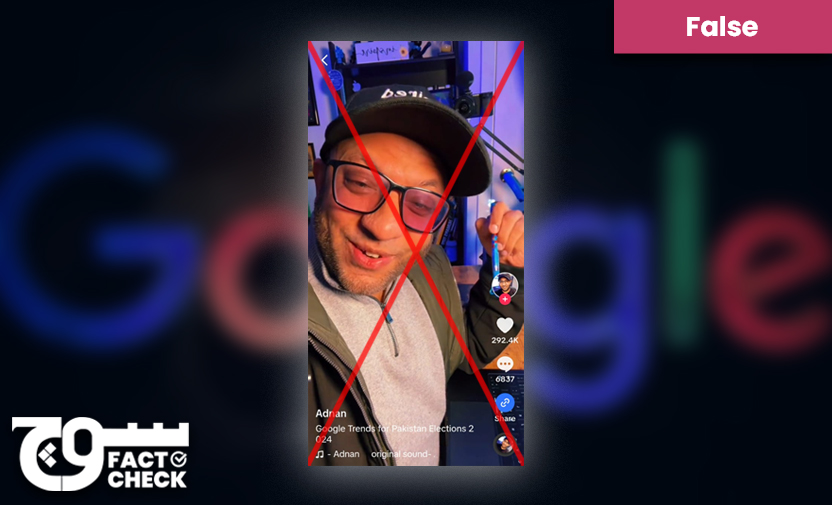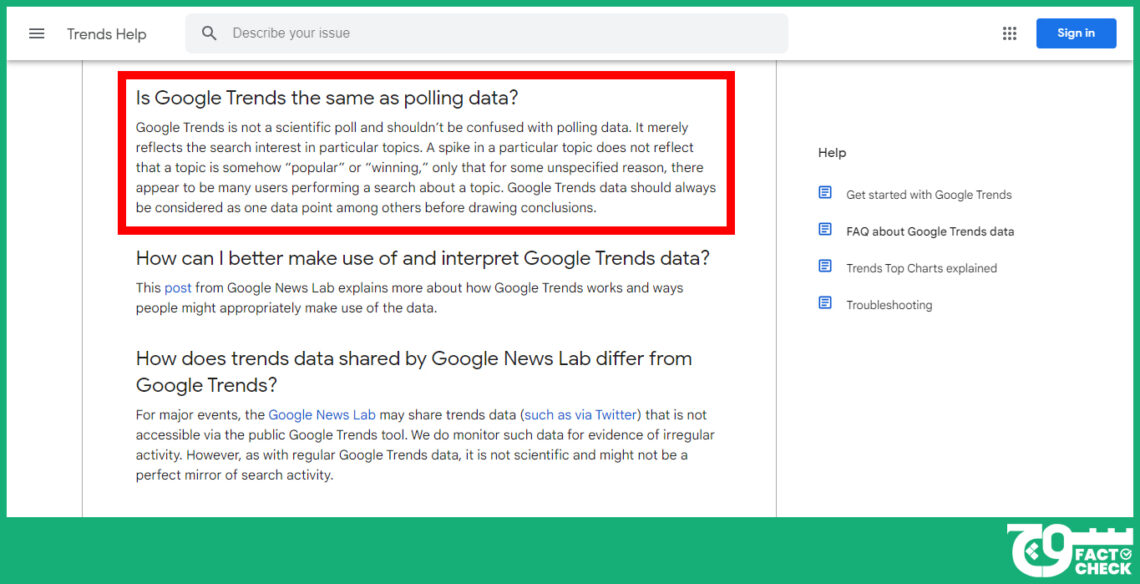
Claim: Google Trends predicted who would win the 2024 general election in Pakistan and that data proved that “PTI is on top”.
Fact: Google Trends shows a summary of searches by people around the world; it can be narrowed down according to categories, time period, and location, among other filters. The FAQs page of Google Trends itself refutes the claim that the toll can be considered a scientific poll or that it can depict polling data.
On 6 February 2024, Adnan Hashmi, “a self taught personal finance content creator,” as per his bio on his TikTok account, @inspiredanalyst, posted a video, which, according to him, shows how Google data predicted the Pakistan Tehreek-e-Insaf (PTI) would win the 2024 general elections.
The following is a transcript of what Adnan Hashmi says:
“دو دن کے بعد پاکستان میں الیکشنز ہیں لیکن ڈیٹا کے ذریعے اس سے پوچھتے ہیں کے الیکشن جیتنے والا کون ہے؟
[After two days, there are elections in Pakistan, but through data, we ask [Google] who is going to win the election?]”
“اس کے لیئے ہم جائیں گے trends.google پہ اور region جو ہے ہم select کریں گے پاکستان۔
[For this, we will go to trends.google and the region we will select is Pakistan.]”
“سرچ میں ہم لکھیں گے ’شیر آیا‘۔ پچھلے 12 مہینے میں شیر اک واری فر، بہت زیادہ searching چل رہی ہے۔
[In the search we will write ‘the tiger enters’. In the last 12 months, ‘the tiger, once more,’ there has been a lot of searching going on.]”
“شیر کے ساتھ اب ہم ڈالیں گے زرداری، سب پہ بھاری، پی پی پی۔
[With the tiger, we will now add Zardari, the most significant amongst all, the PPP.]”
“تو بھئی یہ جو رتتے ہیں یہ پی پی پی والے ہیں اور یہ جو نیلے ہیں یہ ہمارے شیر والے ہیں۔ شیر اوپر جا رہا ہے پی پی پی سے۔ Very much understandable
[So, the red line shows those who are PPP and the blue lines are our tigers. The tiger is above the PPP… very much understandable]”
“اب تیسری بار ہم سرچ میں ان سب کے ابّا جان، پی ٹی آئی، کو ڈالیں گے اور دیکھیں گے کیا رزلٹ آتا ہے؟
[Now, for the third, we will put the father of them all, the PTI, in the search bar and see what is the result?]”
“پی ٹی آئی، پی ٹی آئی yellow ہے، yellow کو دیکھو، یہ کہیں پہ بھی نہیں بھٹک رہے اس کے۔ yellow cross کر رہا ہے ان کو۔
[PTI, PTI is yellow, look at the yellow line, they [the PML-N and the PPP] are not wandering anywhere close. The yellow is crossing them all.]”
“لوگ کتنا زیادہ پی ٹی آئی کو سپورٹ کر رہے ہیں، ڈیٹا کے ذریعے سے پتا چل رہا ہے۔ PML-N, PPP, PTI, all categories, past 12 months, Pakistan, all web searches… PTI is on the top!
[How much are the people supporting PTI? We know this from the data. PML-N, PPP, PTI, all categories, past 12 months, Pakistan, all web searches… PTI is on top.]”
“دھاندلی تو تم کر لو گے، ڈیٹا کو کیسے ڈیلیٹ کرو گے؟ Data is telling you the truth!
[You may be able to do rigging, [but] how will you delete the data? Data is telling you the truth!]”
“تم لوگ کیا کہتے ہو اس بارے میں؟
[What do you guys say about this?]”
Amid the 2024 general elections in Pakistan, held on 8 February, Soch Fact Check has observed an influx of false and misleading claims that may impact public opinion and voter behaviour.
2024 elections
The general elections in Pakistan were marred by allegations of rigging as results were declared (archive) “more than 60 hours after voting ended”, with PTI-backed independent candidates taking lead over those who contested on the Pakistan Muslim League-Nawaz’s (PML-N) ticket.
Despite being jailed (archive) for a total of 31 years for corruption, leaking state secrets, and an unIslamic marriage, former prime minister Imran Khan declared victory in a speech generated by artificial intelligence (AI), with 93 of the 264 seats secured by his independent candidates, according to the Reuters article cited above. The party of his main opponent, PML-N Supremo Nawaz Sharif, got 75 seats, with the former premier, too, claiming he won.
Former foreign minister Bilawal Bhutto-Zardari’s Pakistan People’s Party (PPP) was able to secure 54 seats, while the Muttahida Qaumi Movement-Pakistan (MQM-P) bagged 17 seats.
The PTI cried foul (archive) as the results of 18 seats “allegedly won by the party were ‘falsely changed’” and called for protests not just across Pakistan but all over the world, including in Chicago, Manchester, Washington, and New York City. Authorities consequently imposed restrictions on “illegal gatherings”.
As the two former PMs claimed victory, Pakistan Army Chief General Syed Asim Munir advised the political parties “to show maturity and unity” and said there was a need to “move on from the politics of anarchy and polarisation which does not suit a progressive country of 250 million people”, according (archive) to the military’s media wing, the Inter-Services Public Relations (ISPR).
The pre-poll political landscape in Pakistan was characterised by distinct circumstances for Khan and Sharif amid the shadow of alleged military interference. Imran Khan, incarcerated since 5 August 2023, was consequently disqualified from contesting elections whereas the latter was “once targeted by Pakistan’s military establishment” but “appeared to have won the favour of the generals for the 2024 vote”, according to an Al Jazeera report (archive).
Sharif returned (archive) to Pakistan in October 2023 after staying in London for years. He had left for the UK in 2019 on medical grounds (archive) after being handed a seven-year jail sentence over corruption charges (archive). Six years later, however, he was cleared (archive) of all charges and a lifetime ban on convicted politicians for running for office was ruled unconstitutional.
Fact or Fiction?
“Google Trends tells us what people are searching for, in real time,” according to the Google News Initiative. Search results “feature data visualisations for Interest over time and Interest by subregion, as well as lists of Related topics and Related queries”, the platform says.
A page listing the frequently asked questions (FAQs) for Google Trends’ data states that it “provides access to a largely unfiltered sample of actual search requests made to Google”; this data is anonymised, categorised, and aggregated.
The Google Trends data holistically shows searches from people around the world, “but it can also reflect irregular search activity, such as automated searches or queries that may be associated with attempts to spam our search results”, the FAQs page notes. This data is based on two types of samples: real time data, which covers the past seven days, and non-real time data, which “goes as far back as 2004 and up to 72 hours before your search”.
The FAQs page also addresses the question as to whether Google Trends is the same as polling data, stating:
“Google Trends is not a scientific poll and shouldn’t be confused with polling data. It merely reflects the search interest in particular topics. A spike in a particular topic does not reflect that a topic is somehow ‘popular’ or ‘winning,’ only that for some unspecified reason, there appear to be many users performing a search about that topic. Google Trends data should always be considered as one data point among others before drawing conclusions.”

This means that Google Trend data is only about the number of searches around a topic and offers users to compare the same with other popular topics. It is not an indicator of how many people are predicted to vote for a particular party during an election.
Moreover, downward-trending lines on the search results page indicate that the relative popularity of a search term is decreasing and “not necessarily that the total number of searches for that term is decreasing, but that its popularity compared to other searches is shrinking”.
Since this data does not indicate a political party’s potential success at an election, downward-trending lines cannot predict which party would perform better at the polls.
Therefore, the claim by Adnan Hashmi is false.
However, Google did launch a tailored page for search trends pertaining to the “Pakistani general election 2024”. Nonetheless, this cannot be used to predict election results either and the information it provides does not validate the claim under question in any way.
Virality
Soch Fact Check found that Hashmi posted the video on all of his social media accounts, including TikTok, Instagram, Facebook, YouTube, and X (formerly Twitter), where he received over 3.9 million, 694,000, 17,500, 1,400, and 648 views, respectively.
The video was also shared here, here, here, here, here, and here. It was posted as a Facebook Reel here and here.
Similar versions of the video were shared here, here, here, here, here, here, here, here, here, and here.
Conclusion: Google Trends did not predict PTI’s victory in the general election of 2024. The tool shows a summary of searches by people around the world; it can be narrowed down according to categories, time period, and location, among other filters. The FAQs page of Google Trends itself refutes the claim that the toll can be considered a scientific poll or depicts polling data.
Background image in cover photo: Mitchell Luo
To appeal against our fact-check, please send an email to appeals@sochfactcheck.com
